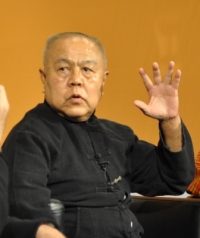Back to Speakers and Discussants
Sulak Sivaraksa
Sulak Sivaraksa (born 1933) is Professor of Sociology. Amongst others he taught at the University of California (Berkeley), Cornell University (Ithaca) and the University of Toronto. Educated in England and Wales, Sulak returned to his home country Siam in 1961. In 1968 he founded the Sathirakoses-Nagapradeepa Foundation, a network committed to social justice with ecological vision. During the 1970s Sulak became the central figure in a number of non-governmental organisations. Through his involvement with these organisations, Sulak began to develop indigenous, sustainable, and spiritual models for change. Since then he has expanded his work to the international level. He has co-founded the Asian Cultural Forum on Development, the International Network of Engaged Buddhists and the project "Alternatives to Consumerism". 1995 he was granted the Right Livelihood Award, also known as Alternative Nobel Prize.
Selected Publications
Conflict, Culture, Change. Engaged Buddhism in a Globalizing World (2005)
Seeds of Peace: A Buddhist Vision for Renewing Society. Parallax Press/International Network of Engaged Buddhist/ Sathirakoses-Nagapradipa Foundation (1992)
Selected Quotations
"Consumerism is able to dominate much of contemporary society because individuals have become alienated from their culture and from each other. The sense of community that led people to share scarce resources and work cooperatively has been supplanted by the vile maxims of the masters of mankind, by an anger and competitiveness that causes people to seek acquisitions at the expense of their neighbors. In sum, consumerism is a consequence of using greed and violence to regulate socioeconomic relations."
In: Alternatives to consumerism - a Buddhist programme, www.sulak-sivaraksa.org
"In Buddhism, prosperity is defined as "more being." As such, it cannot be realized atomistically, only collectively and with an emphasis on spirituality. Buddhism denounces and renounces greed, because it is seen as leading one down the perfidious road of aggression and hatred - in a world, of suffering. Greed can never lead to satisfaction, individually or collectively. Thus Buddhism seeks to show how to be content with changing oneself - that is, self-cultivation - and emphasizes the importance of caring about, promoting, and benefiting from one another's wellbeing. "
In: Alternatives to consumerism - a Buddhist programme, www.sulak-sivaraksa.org
"One of the key and unique teachings by the Buddha is the interrelatedness among all beings. The teachings of the Buddha, in addition to the great extent on renunciation, include numerous guidelines of how individuals should live together in a peaceful and beneficial manner. "
In: Buddhist Values for the Righteous Politics, www.sulak-sivaraksa.org




